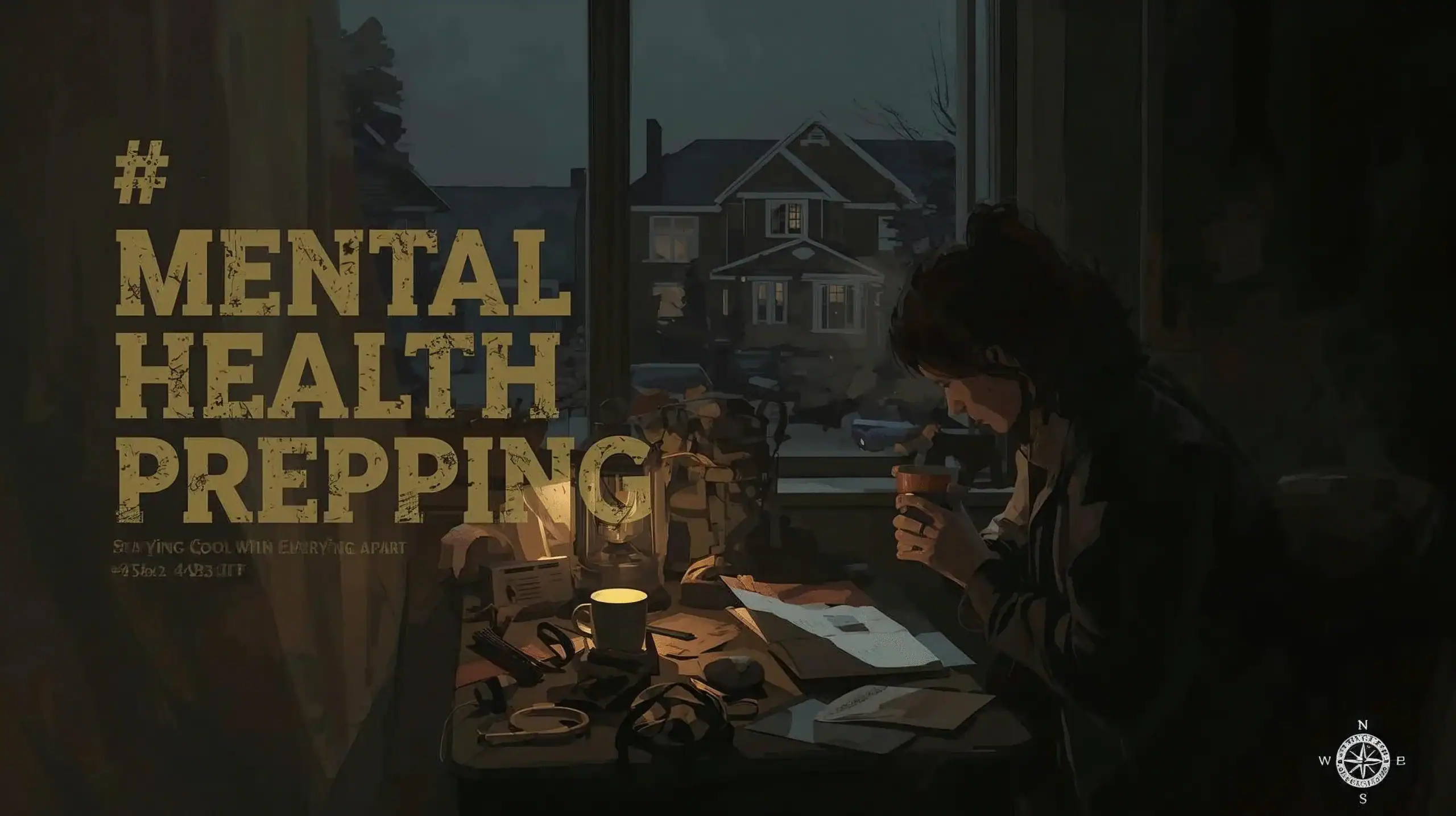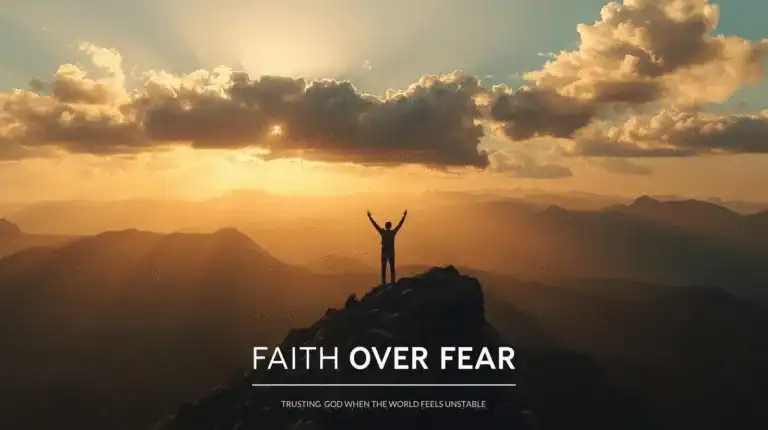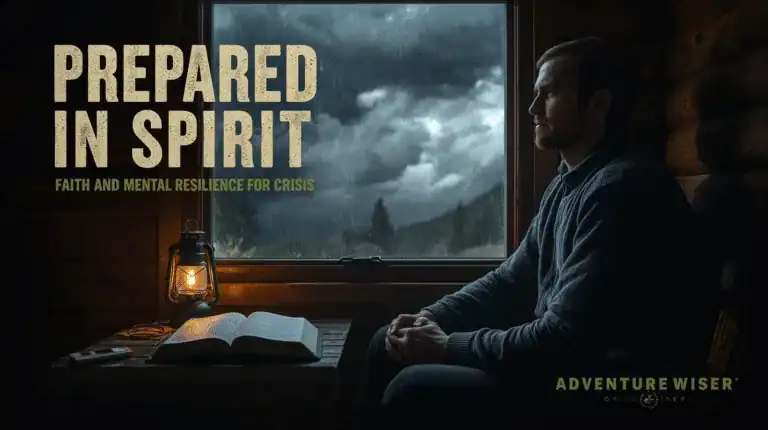
Mental Health Prepping: Staying Cool When Everything Falls Apart
“Therefore keep watch, because you do not know the day or the hour.” Matthew 25:13 (NIV)
When the Lights Go Out, Your Mind Better Stay On mental health prepping
The hum of modern life is so constant you barely notice it—until it’s gone. One second you’re scrolling TikTok or half-watching Netflix, the next—click—silence. Not just the lights. Your phone is a black brick. The Wi-Fi router isn’t even trying. Even the digital clock on the wall looks dead, its blank face staring back at you like an accusation.
Then the neighborhood wakes up in panic. Bob next door slams his car door over and over, cursing at an engine that refuses to turn over. Your spouse jabs their phone’s power button like they can bully it back to life. And down the block, Mrs. Henderson decides the best response is testing her smoke detector… indoors.
That’s when it hits you: this isn’t just a blackout. This is where mental health prepping kicks in. Because while everyone else is losing it, your calm is the survival tool that matters most.
Why Panic Spreads Like Wildfire (And How to Be Fireproof)
Here’s something wild: humans are basically emotional copy-cats. Scientists call them “mirror neurons”—these little brain cells that make us automatically mimic what we see around us. It’s why you yawn when someone else does, and why one person freaking out can turn an entire group into a panic-fest.
But here’s the beautiful flip side—calm works the exact same way.
I watched this play out during a neighborhood emergency last year. When Mrs. Chen from two houses down stayed calm and started organizing people into groups, everyone else naturally followed her lead. Nobody appointed her the leader, but her steady energy just drew people in. Before we knew it, we had a whole system going: some people checking on elderly neighbors, others sharing supplies, kids helping where they could.
That’s the power of “emotional contagion”—and trust me, you want to be the person spreading the good kind.
Your Brain on mental health prepping: Why Smart People Make Dumb Choices

Ever wonder why people do incredibly stupid things during emergencies? Like trying to charge their phones during a power outage or forgetting to grab their keys while evacuating? It’s not because they’re idiots—it’s because panic literally hijacks your brain.
When you’re stressed, your brain’s alarm system (the amygdala, if you want to get technical) basically shoves your thinking brain into the back seat. Suddenly, you’re running on pure instinct, and instinct doesn’t always make the smartest choices.
I remember during that blackout I mentioned, one of my neighbors tried to use his gas grill… inside his garage. This is a guy who’s an engineer, super smart, but panic made him forget basic safety. Thankfully, his wife talked him down before anything bad happened.
When you stay calm, your thinking brain stays in charge. You can prioritize, problem-solve, and make decisions that actually help instead of hurt.
Building Your Mental Muscle: It’s Like Going to the Gym, But for Your Brain

The good news? You can train for this stuff just like you’d train for a marathon. Here’s how I’ve been building my mental resilience, and trust me, it works:
Start Small and Build Up
I began with what I call “controlled uncomfortable situations.” Nothing dangerous, just things that push you out of your comfort zone:
- Taking cold showers (sounds weird, but it teaches your brain that discomfort isn’t the end of the world)
- Going for walks in crappy weather instead of staying inside
- Trying a 24-hour “no electricity” challenge at home on weekends(where I live, the electric company sometimes does this for me without warning!)
The point isn’t to suffer—it’s to prove to yourself that you can handle more than you think.
Daily Mental Maintenance
Just like you brush your teeth every day, your mind needs regular care too. I’ve found a few simple things that make a huge difference:
Morning routine: I spend five minutes each morning doing what I call “reset breathing”—just slow, deep breaths while thinking about what I’m grateful for. Sounds cheesy, but it actually works.
Evening check-in: Before bed, I write down three things that went well and one thing I learned. Even on bad days, there’s usually something worth noting.
Sleep discipline: This one was tough for me because I used to have terrible sleep habits, but getting good sleep is like having a superpower. Everything’s harder when you’re tired—especially staying calm under pressure.
Building Your Mental Toolkit
Just like you carry a knife or flashlight, you need mental tools you can use anywhere:
- The 5-4-3-2-1 technique: When things get overwhelming, name 5 things you can see, 4 you can touch, 3 you can hear, 2 you can smell, 1 you can taste. It pulls your brain back to the present moment.
- Personal mantras: Mine is “Breathe, think, act.” Simple, but it stops me from jumping straight to panic mode.
- Comfort items: I keep a small pocket notebook where I jot down meaningful quotes and reminders. Just flipping through it reminds me what I’m working toward.
What This Looks Like in Real Life for mental health prepping
During that week-long blackout, (ice storms, I’m looking at you) here’s what our routine looked like:
Morning: Coffee over a camp stove (priorities, people), quick family meeting to plan the day.
Day: Organized tasks—someone on water duty, someone managing food, kids helping with whatever they could handle.
Evening: Dinner by lantern light, stories, games. We actually started looking forward to it.
The key wasn’t pretending everything was fine—it was acknowledging the situation while staying focused on what we could control.
When You’re the Calm in Someone Else’s Storm
If you’re the “prepared one” in your family or friend group, you’ve probably noticed people look to you when things get weird. That’s both a privilege and a responsibility.
I’ve learned that being the calm person doesn’t mean being emotionless or perfect. It means:
- Acknowledging fears (yours and others’) without letting them take over
- Breaking big problems into smaller, manageable pieces
- Celebrating small wins along the way
- Admitting when you don’t know something instead of pretending
Last winter, when our neighbor’s heat went out during a cold snap, they came to our door in full panic mode. Instead of just offering solutions, I first listened to their fears, validated how scary it was, then we worked through options together. They ended up staying warm and safe, but more importantly, they felt supported.
Simple Gear That Actually Helps
You don’t need to spend hundreds of dollars on fancy equipment. Here are some simple things that have genuinely helped me stay centered:

- A Bible, good journal and pen: Writing things down gets them out of your head. I use a waterproof notebook because, well, life happens. I also keep a small Bible with me—sometimes you need perspective that goes beyond your own thoughts.
- Comfortable earbuds: Sometimes you need to block out chaos and just hear something calming.
- A small comfort item: Could be anything—a smooth stone, a meaningful coin, whatever fits in your pocket and makes you feel grounded.
The Reality Check for mental health prepping
Look, I’m not saying mental preparation is easy or that you’ll never feel scared. I still get anxious when things go sideways. The difference is, I don’t let the anxiety drive the bus anymore.
During that blackout, there were definitely moments when I felt overwhelmed. The difference was, I had tools to work through it instead of getting stuck in it. And seeing my family stay calm because I was calm? That was worth all the practice.
Your Next Step inmental health prepping
Here’s what I’d suggest: pick one small thing from this article and try it for a week. Maybe it’s the morning breathing thing, maybe it’s keeping a simple journal, maybe it’s just paying attention to how you react to minor stresses.
The goal isn’t to become some Zen master overnight. It’s to build a little more resilience each day, so when the real test comes—and it will—you’re ready.
Remember, all the gear in the world won’t help if your mind isn’t prepared. But a calm, prepared mind? That can turn any crisis into just another problem to solve.
A Quick Note: Some of the gear links I might mention are affiliate links, which means I get a tiny commission if you buy something. I only recommend stuff I actually use and trust. Any commission I earn goes straight back into testing more gear and keeping the lights on around here.






